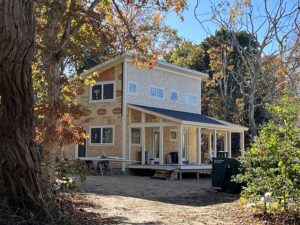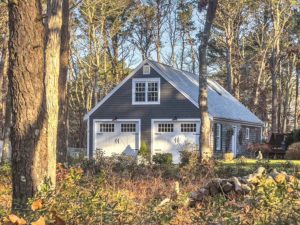WELLFLEET — The owners of a two-acre property at 19 School House Hill Road are overseeing the finishing touches on an accessory dwelling unit (ADU) built under the town’s still-new bylaw aimed at boosting year-round residency. But at a zoning board of appeals hearing on Oct. 24, owners Eileen Raffo and Katherine Eppley hit a snag: a letter from the National Park Service alerted them that, because their property is in the Cape Cod National Seashore, any new construction is a violation of Seashore zoning guidelines.

The town’s ADU bylaw, which was approved by voters in 2021, allows homeowners to build accessory residential structures of up to 1,200 square feet by right, as long as the building conforms to other zoning and health regulations. For properties within the Seashore, however, the bylaw requires homeowners to go before the ZBA for a special permit.
Until last week’s hearing, the regulatory board had not received a special permit application for an ADU in the Seashore, according to ZBA chair Sharon Inger.
The National Park Service letter, signed by Seashore Supt. Jennifer Flynn, warned the ZBA and the homeowners that if the board approved the special permit and the ADU is built, the property would be out of compliance with the Park’s founding legislation, which prohibits new development. And that, Flynn wrote, would “complicate future sales” — and possibly not only of Raffo and Eppley’s house but of all houses within the Seashore’s boundaries.
A Doubly Odd Case
The extent of the noncompliance is unusually complicated in this case. That’s because the property does not have a certificate of suspension of condemnation, according to Supt. Flynn’s letter.
When Congress established the Seashore in 1961, the National Park Service took most of the undeveloped land within the 43,000-acre park through eminent domain. But owners of houses built before 1959, when the Seashore legislation was first proposed, were allowed to secure so-called certificates of suspension of condemnation, allowing them to retain ownership in perpetuity. These owners of property in the Seashore may also sell their houses, and in those cases the certificate is passed along to the new owners.
According to Seashore Deputy Supt. Leslie Reynolds, Eppley and Raffo do not have a certificate because no previous owner ever applied for one.
Flynn’s letter said that if Raffo and Eppley pursue the ADU project, the property would become ineligible for a certificate of suspension of condemnation. And that would mean that the Park could exercise its authority to take the property through eminent domain.
Such a taking involves paying fair market value for the property, and instances in which the Park exercises this power appear to be few and far between. “Very rarely does the Seashore have the money to pay market value,” said Tim Dickey of Truro, the contractor for the project.
“We have seen these letters before, but I don’t know if the Seashore has ever actually done it,” Inger said.
There’s another twist in this case. The ADU on School House Hill Road has already been built, Dickey said. That’s because of a clerical error made months ago by the town’s building department: former Building Commissioner Angelo Salamone issued a building permit for the project in June without referring the applicants to the zoning board as required by the ADU bylaw.
Interim commissioner Victor Staley caught the error and referred the homeowners to the board, Staley told the Independent. Dickey has paused work as the application is being reviewed by the board of appeals, he said.
“It’s very bad news for us,” Dickey said. “Now the question is whether the homeowners want to move forward with the project given what the Seashore is saying.”
The ZBA continued the special permit hearing in this case to its Nov. 14 meeting, citing missing materials in the application. But the board is poised to approve the application once the rest of the information comes in, Inger said.
“What we go by is the town’s bylaws,” Inger said. “We have no role in administering federal law here in little Wellfleet.”
Whose Rules Rule?
At a meeting of the Cape Cod National Seashore Advisory Commission on Aug. 5, Supt. Flynn said that towns with bylaws that allow the construction of ADUs in the National Seashore are at odds with the park’s enabling legislation. That could put the entire town’s certificates of suspension of condemnation at risk of termination, Flynn warned.
“Technically, if a town passes a zoning ordinance in conflict with the secretarial standards, the act says that everyone in the town’s certificate of suspension of condemnation is supposed to be terminated,” Flynn said. “That’s in the act.” But she added, “That is not where I would like to go.”
Reynolds wrote in an email that while Flynn’s statement is accurate, the Seashore’s approach is to target only homes that actually have newly built ADUs.
Wellfleet Planning Board chair Gerald Parent said that when the town was drafting its ADU bylaw in 2021, it reached out to the Seashore for input on the regulation. He said that the town never received a response.
“When the bylaw got passed, and the Seashore did not come to any select board or planning board meetings, it passed as a special permit,” Parent said.
Reynolds confirmed that the Park had received notice of proposed bylaw amendments. She said that her agency had provided feedback to the planning board in August 2022. But that was after the bylaw had been adopted at town meeting.
Town Planner Beth Pyles asserted that the town’s ADU bylaw is not actually in conflict with the Seashore’s foundational documents.
Pyles said that the definition of allowed development stipulates that only the construction of the main dwelling on a property needs to have been built before 1959. “There is no such modifier for accessory structures regarding when they can or cannot be built,” Pyles said. Truro Land Use Planner Barbara Carboni, who is also a member of the Wellfleet Select Board, told the Independent that Truro also concluded that ADUs are a lawful use in the Seashore.
The state’s new Affordable Homes Act, which takes effect in February, also poses a jurisdictional conflict with the Park’s enabling legislation. Towns with ADU bylaws are currently grappling with how to square local bylaws with the new state law. But whether the Park’s legislation precludes the Seashore rules from being in compliance with state law is unclear, Flynn said at the advisory commission meeting on Aug. 5.
“It is going to be a balancing act for us, because we have a congressional law that says one thing and a Massachusetts law that says something different,” she said. “The Affordable Homes Act is going to put people in a state of conflict, because by adhering to the Massachusetts state law, they will be violating the federal law.”
According to the Seashore’s zoning guidelines, the Park’s zoning must be “consistent with the laws of Massachusetts.”
State Sen. Julian Cyr said that he doesn’t know how the conflicting laws square. He is currently waiting for answers from the state Executive Office of Housing and Livable Communities, which will administer the law, on how to reconcile the laws.
“State and federal law can conflict, and they do conflict sometimes,” Cyr said. “We often don’t take into account how a national park interacts with a state zoning law.”

